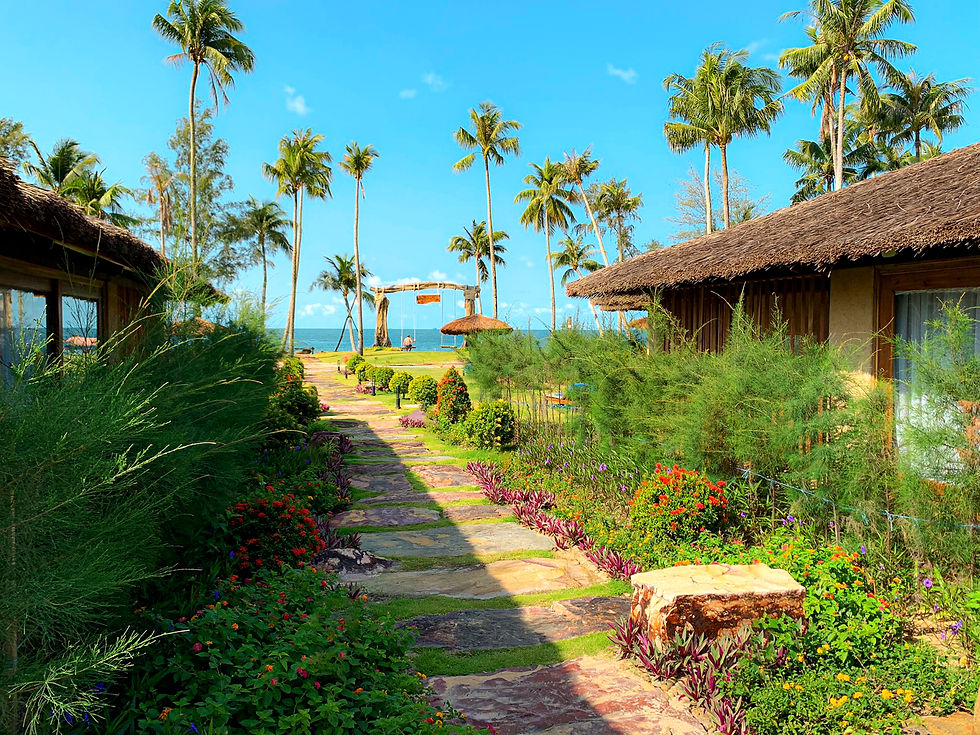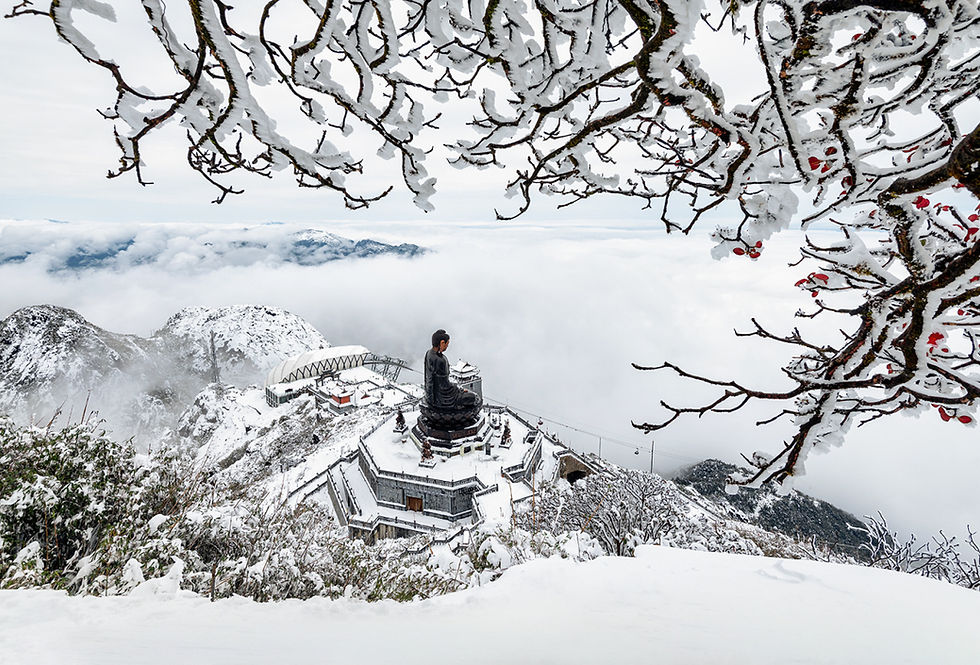Expert Tips for Planning Your Vietnam Trip Over Christmas and New Year
- Lan Lum
- Jul 29, 2024
- 5 min read
It’s July, and many people are starting to plan their Vietnam trips for the Christmas and New Year holidays. A common issue I’ve noticed is that many travelers include Da Nang and Hoi An in their itineraries with the expectation of a relaxing beach holiday. However, this expectation may not align with reality. Just as you want to avoid Chiang Mai during the burn period or Okinawa during the jellyfish season (unless you don’t plan to swim), you might want to reconsider visiting Vietnam’s Central Coast during the rainy season. There’s no hard-and-fast rule about where you should or shouldn’t go at any specific time of year, as it ultimately depends on the experiences you want to have at your chosen destination. Additionally, what is good weather for one person might not be ideal for another. My goal for this article is to provide a broad overview of regional weather in Vietnam and essential tips for trip planning during the December/January period.

Light flooding in Hoi An's Old Town in early October. To many Western tourists, the flood makes for an interesting experience. Source: Vnexpress
Weather Overview
Vietnam has three distinct climates in its main regions: North, Central, and South, with variations based on altitude and distance from the sea. In December and January, the weather is typically cold and dry in Northern Vietnam, cool and rainy on the Central Coast, and warm and dry in Southern Vietnam. While Hanoi’s summer can be unbearably hot due to extreme heat and high humidity, winter is mild and dry, making it pleasant for walking and exploring Hanoi and its surrounding countryside. For a cultural experience and stunning scenery, don’t miss Ninh Binh, known for its rice paddies, karst mountains, rivers, and caves. There are also many beautiful, lesser-known cities around Hanoi, such as Moc Chau, Mai Chau, and Pu Luong, which are worth visiting. The Northern Highlands (Ha Giang, Lao Cai, Sapa) can be quite cold in winter—Sapa may even experience snow in December—so pack warm clothes if traveling to this region.
Southern Vietnam typically enjoys pleasant weather in December and January (low of 23°C, high of 32°C). The dry heat and minimal rainfall make it ideal for exploring Ho Chi Minh City and its surroundings. For a perfect beach holiday, consider Phu Quoc, an island located about an hour by flight from Ho Chi Minh City or a short ferry ride from the southern coast. Another excellent destination is Da Lat, a charming highland city about an hour's flight northeast of Ho Chi Minh. Da Lat’s cooler temperatures, beautiful landscapes, and numerous parks and theme parks make it an attractive destination for kids and adults alike.

Perfect beach weather and stunning accommodation at Grand Ocean Bay Resort Phu Quoc
The Central Coast in December and January is just emerging from the rainy and typhoon season, which peaks in October and November. Rain eases in early December but expect showers and light drizzles 50%-70% of the time. The water temperature is around 22°C, which is not ideal for swimming. However, the cooler temperatures make exploring the cities pleasant, and you’ll avoid the crowds of tourists that flock to Hoi An every spring and summer. If you’re set on a beach holiday, consider heading further south. Nha Trang offers good beaches and warmer weather in late December and January.
Be Prepared for High Costs
December 23 to early January is the peak season in Vietnam, so accommodation prices will be at least 20% higher than at other times of the year. Expect crowds at major tourist spots. You might want to skip popular spots such as Halong Bay, where beautiful views may be obstructed by numerous cruise boats. Even lesser-known destinations might be filled with local tourists on weekends, so consider both the dates and the days of the week when planning your trip. If you prefer a quieter experience, consider visiting Vietnam during other times of the year (February-May and September), or contact us for support with planning an authentic, immersive trip.
When to Plan and Book Your Trip
Start researching Vietnam as early as possible. The more informed you are, the more likely you are to plan a realistic itinerary and find the best accommodation and flight deals. If you need double rooms, book at least three months in advance for the best prices and selection. For family or larger group accommodations, book four to five months in advance, as family rooms are limited and fill up quickly, especially during peak season. Affordable family accommodations often sell out first, so if you’re on a strict budget, consider booking even earlier.

Snow on the Fansipan, Sapa. Source: Vnexpress
Sample Itineraries
For first-time travelers to Vietnam, here are some suggestions for a two-week trip covering major destinations from North to South during December/January:
Hanoi (2 days) - Lan Ha Bay (2 days) - Ninh Binh (1 day) - Phu Quoc (4 days) - Can Tho (3 days) - Ho Chi Minh City (2 days)
Themes: Culture, sightseeing, beach
Great for: Families, friends/couples, seniors
Hanoi (2-3 days) - Ninh Binh (2 days) - Phong Nha (3 days) - Ho Chi Minh City (1 day) - Can Tho (3 days) - Ho Chi Minh City (2-3 days)
Themes: Sightseeing, outdoor adventures, culture
Great for: Friends/couples, families with older children
Hanoi (2 days) - Ninh Binh (1 day) - Hue (2 days) - Hoi An (3 days) - Can Tho (2-3 days) - Ho Chi Minh City (2-3 days)
Themes: Culture, history, sightseeing
Great for: Families with older children, friends/couples, seniors
Hanoi (2 days) - Ninh Binh (2 days) - Da Lat (3 days) - Phu Quoc (5 days) - Ho Chi Minh City (2 days)
Themes: Culture, sightseeing, beach, family fun
Great for: Families, friends/couples, seniors

Phong Nha - A hidden gem for those seeking outdoor adventures. Source: Vietnam.travel
Conclusion
I hope these itineraries, along with the information and tips provided, give you a good starting point to plan a successful Vietnam trip. As with all trip planning, be sure to research weather, accommodation, and transportation thoroughly. Watch out for scams (e.g., too-good-to-be-true prices), and don’t forget to organize your visa well in advance to avoid additional fees and unnecessary stress. If you find the research overwhelming and want to ensure a smooth trip, consider enlisting a trusted travel agent. While it may cost a bit more, the advice and support of an experienced, knowledgeable agent can save you a lot of time, headaches, and potentially money.
Please let me know in the comments if you have additional questions or need further information. I promise to address your questions in future articles. My commitment is to deliver as much value as possible to travelers like you so that you can be informed and empowered to experience the best Vietnam has to offer.




Comments